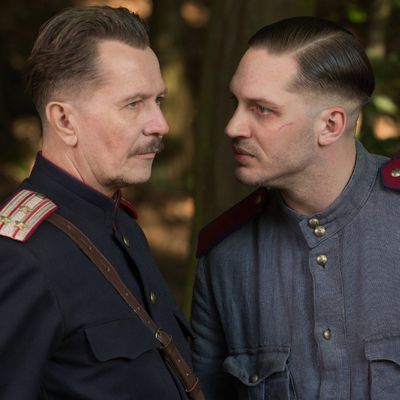
Dear Lord, what happened here? Can one file criminal charges against a film that wastes this good a cast and premise? Child 44, directed by Daniel Espinosa and scripted by Richard Price, is based on Tom Rob Smith’s acclaimed novel, which itself was based on a series of shocking real-life murders in the Soviet Union committed between 1978 and 1990. This fictionalized variation transplants the crimes into the paranoid, industrial hellscape of Stalin’s USSR, and it comes with loads of historical and sociopolitical context. So much ambition. So little competence.
The investigation into “the Ripper of Rostov,” here called “the Wolf of Rostov,” has already inspired one terrific work of art, Chris Gerolmo’s 1995 HBO film Citizen X, starring Steven Rea and Donald Sutherland — still one of the best TV movies I’ve ever seen. Engrossing and claustrophobic, Gerolmo’s film portrayed the single-minded determination of a forensic investigator (Rea) as the secrecy and distrust of the Soviet state bore down upon him. We’re not supposed to compare movies like this — Child 44 is in no way aspiring to be Citizen X — but the contrast is stark and telling. The earlier film displayed an obsessive focus on the investigation; this new film is concerned with everything but the investigation.
Child 44 starts with a title telling us about the 25,000 people who died in Ukraine as a result of Stalin’s policies, then shows us a young Ukrainian orphan being approached by a Soviet soldier. “What’s your name?” the soldier asks. “I don’t want it anymore,” the boy whimpers. So the soldier gives him the name Leo, “like a lion,” and the boy grows up to be a strapping young Red Army soldier, played by Tom Hardy, who becomes a national hero when he’s photographed sticking the Soviet flag atop the devastated Reichstag in the closing days of World War II. Back in Moscow after the war, Leo becomes a devoted but honorable officer in the Secret Police, dutifully hunting down traitors with an earnest belief in the inherent justice of the Soviet system. To go along with his delusion, Leo has wed Raisa (Noomi Rapace), a woman he once spied on the street and insisted on meeting. For him, it was love at first sight; for her, it’s clearly a marriage of convenience.
What’s past is prologue, however, and the ostensible central story doesn’t kick in until we’re well into the movie. While hunting down enemies of the state, Leo is asked to cover up the murder of a young boy by the train tracks. The child has been drowned and cut up with surgical precision, but Stalin’s Russia doesn’t believe in murder — such a capitalist crime has no place in a worker’s paradise — so the death is ruled an accident. So, too, is the one after that. Leo the good soldier goes along with the ruse. And, really, so does the movie — as it seems more interested in Raisa’s suspicion for counterrevolutionary activities, and in the cannibalistic paranoia of the state security apparatus, whose very currency is suspicion. It’s only after he and his wife are themselves exiled to the industrial wasteland of Volsk that Leo begins to realize the magnitude of these murders, and starts investigating.
But there’s so much more at play in Child 44. There’s the demented officer (played by Joel Kinnaman, doing solid work as a soft-spoken psycho) who refuses to stop pursuing Leo and Raisa, in part due to his obsession with the latter. There’s the general in Volsk (Gary Oldman) who himself is torn between his duty to the state and his duty as a father. There’s a subplot about the persecution of gays in the USSR. Jason Clarke shows up briefly, gets in a fight, and is shot. Vincent Cassel’s in there, too, as one of Stalin’s torturers. And then there’s the killer himself, who shares some similarities with Leo — similarities the film uses to make some broader, forced point about children lost and found. The film even finds time for some pointless action scenes -— in particular, one gruesome, incoherent mêlée in a train car, and one final, idiotic mud-fight. There’s so much other stuff here that the actual investigation into the child murders feels like an afterthought, when it should have served as a backbone around which these other narrative elements could be built and developed. Instead, the film treats it like a nuisance.
I don’t think Price’s screenplay can be faulted here, though I don’t know for sure. It’s a faithful adaptation, and it clearly wants to be more than a murder-mystery. But its novelistic ambitions are wildly mismatched to Espinosa’s frenetic direction, which has neither the eye nor the patience to focus our attention or hint at any real subtext. The director serves mainly to rush things along, which would be okay if he had any narrative shorthand. Instead, at times we feel like we’re watching a two-plus-hour trailer for a longer, better movie that might have succeeded in juggling all these diverse elements. A story this dense with incident, character, and history needs to breathe a little — think The Lives of Others, or Zodiac — but Child 44 has no rhythm. It’s blunt, rushed, and scattershot. You’re exhausted, bored, and confused by it at the same time.


